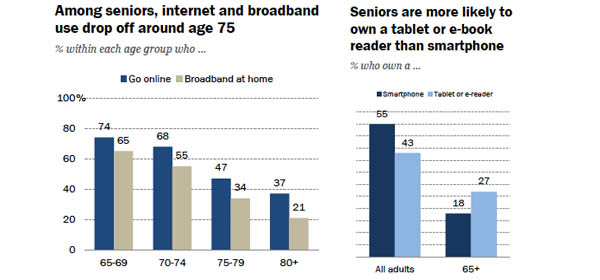
A recent Pew Internet study investigates older adults – aged 65 and up – and how this group uses technology and interacts online. While this group may be assumed to be late to the technology game, in fact the research shows two different groups: one that has embraced technology and supports its benefits, and a second group that is more distant from all things digital.
Here’s a quick snapshot of how older adults are using technology: Nearly 3 in 5 older adults use the internet, almost half have a high-speed broadband connection at home, and 77% have a cell phone (just 18% have a smartphone). But younger, higher-income, and college-educated seniors tend to use these technologies at higher rates than their lower-income and less educated peers. Those non-internet users are split on whether they’re hurt by lack of internet access, with about half (49%) agreeing that unconnected people are missing out and 35% disagreeing.
Once older adults become internet users, the online world becomes integrated into their daily lives. Interestingly, just over 4 in 5 older adults who use social networking sites say they socialize with others—in person, online, or over the phone—more often than online seniors who don’t use social media (71%), and much more so than those who aren’t online at all (63%).
When it comes to trying out new technologies, older adults cite health and physical issues, skeptical attitudes about the benefits, and learning challenges. In fact, more than three-fourths of older adults say they would need someone else to help them learn how to use new technologies. This holds true even among those more tech-savvy seniors who own a smartphone, tablet, or e-reader, 70% think they’d still want to ask for help learning new tech. Libraries, there’s your cue!
Here in Colorado, one of the ILEAD USA teams created a resource guide for libraries who are interested in programming geared toward active seniors. And for those 23% of older adults who say they have a physical or health condition that makes reading difficult, the Colorado Talking Book Library has a variety of resources and options to help. How is your library serving your 65+ community?
Note: This post is part of our series, “The Weekly Number.” In this series, we highlight statistics that help tell the story of the 21st-century library.